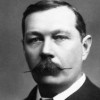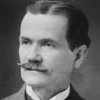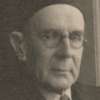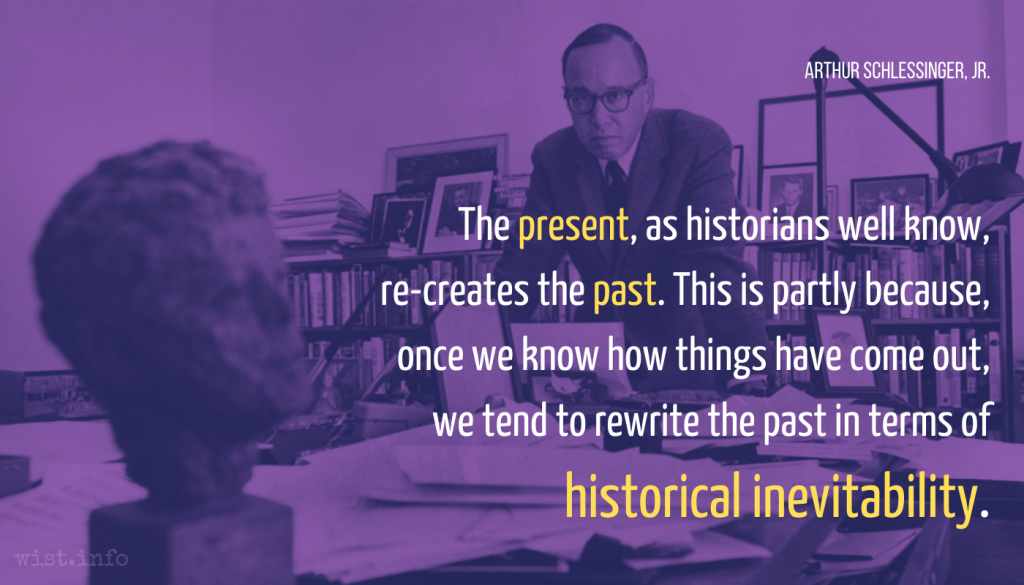“You don’t seem to give much thought to the matter in hand,” I said at last, interrupting Holmes’s musical disquisition.
“No data yet,” he answered. “It is a capital mistake to theorize before you have all the evidence. It biases the judgement.”Arthur Conan Doyle (1859-1930) British writer and physician
Story (1886-04), “A Study in Scarlet,” Part 1, ch. 3, Beeton’s Christmas Annual, Vol. 28 (1887-11-21)
(Source)
Quotations about:
conclusion
Note not all quotations have been tagged, so Search may find additional quotes on this topic.
Know how to rank beliefs not according to their plausibility but by the harm they may cause.
Nassim Nicholas Taleb (b. 1960) Lebanese-American essayist, statistician, risk analyst, aphorist
The Black Swan, Part 2, ch. 13 “Appelles the Painter, or What Do You Do If You Cannot Predict” (2007)
(Source)
The same past data can confirm a theory and its exact opposite! If you survive until tomorrow, it could mean that either a) you are more likely to be immortal or b) that you are closer to death. Both conclusions rely on the exact same data.
Nassim Nicholas Taleb (b. 1960) Lebanese-American essayist, statistician, risk analyst, aphorist
The Black Swan, Part 2, ch. 11 “How to Look for Bird Poop” (2007)
(Source)
An idea starts to be interesting when you get scared of taking it to its logical conclusion.
Nassim Nicholas Taleb (b. 1960) Lebanese-American essayist, statistician, risk analyst, aphorist
The Bed of Procrustes: Philosophical and Practical Aphorisms, “Preludes” (2010)
(Source)
LOGIC, n. The art of thinking and reasoning in strict accordance with the limitations and incapacities of the human misunderstanding. The basis of logic is the syllogism, consisting of a major and a minor premise and a conclusion — thus:
Major Premise: Sixty men can do a piece of work sixty times as quickly as one man.
Minor Premise: One man can dig a post-hole in sixty seconds; therefore —
Conclusion: Sixty men can dig a post-hole in one second.
This may be called the syllogism arithmetical, in which, by combining logic and mathematics, we obtain a double certainty and are twice blessed.Ambrose Bierce (1842-1914?) American writer and journalist
“Logic,” The Cynic’s Word Book (1906)
(Source)
Included in The Devil's Dictionary (1911). Originally published in the "Cynic's Dictionary" column in the San Francisco Examiner (1887-09-04).
See Kettering.
And lead weights to your feet may my words be,
that you move slowly, like a weary man,
to the ‘yes’ and ‘no’ of what you do not see.
For he is a fool, and low among his kind,
who answers yea or nay without reflection,
nor does it matter on which road he runs blind.
Opinions too soon formed often deflect
man’s thinking from the truth into gross error,
in which his pride then binds his intellect.
[E questo ti sia sempre piombo a’ piedi,
per farti mover lento com’ uom lasso
e al sì e al no che tu non vedi:
ché quelli è tra li stolti bene a basso,
che sanza distinzione afferma e nega
ne l’un così come ne l’altro passo;
perch’ elli ’ncontra che più volte piega
l’oppinïon corrente in falsa parte,
e poi l’affetto l’intelletto lega.]Dante Alighieri (1265-1321) Italian poet
The Divine Comedy [Divina Commedia], Book 3 “Paradiso,” Canto 13, l. 112ff (13.112-121) [Thomas Aquinas] (1320) [tr. Ciardi (1970)]
(Source)
(Source (Italian)). Alternate translations:Now learn, my Son,
With tardy foot to make your Judgment run,:
And Fancy's wild excursions to repel
Unhappy they, who, by her lure betray'd.
And, like 'lorn travellers, by meteors led.
Their affirmation or denial give
Unweigh'd, for Fancy leans to Falsehood's part,
And soon to Passion's rule betrays the heart.
And her embruted Slaves in bondage live.
[tr. Boyd (1802), st. 19-20]And let this
Henceforth be led unto thy feet, to make
Thee slow in motion, as a weary man,
Both to the ‘yea’ and to the ‘nay’ thou seest not.
For he among the fools is down full low,
Whose affirmation, or denial, is
Without distinction, in each case alike
Since it befalls, that in most instances
Current opinion leads to false: and then
Affection bends the judgment to her ply.
[tr. Cary (1814)]Let this henceforth be lead unto thy feet,
To make thee move slow, like a weary man,
Both to the Yea and Nay, as far 's you can:
For he among the fools is low enough,
Without distinction, who affirms, denies,
Where one and where the other question lies.
It happens, too, that oftentimes incline
Opinions current to the falser side,
And intellect is by affection tied.
[tr. Bannerman (1850)]And lead shall this be always to thy feet,
To make thee, like a weary man, move slowly
Both to the Yes and No thou seest not;
For very low among the fools is he
Who affirms without distinction, or denies,
As well in one as in the other case;
Because it happens that full often bends
Current opinion in the false direction,
And then the feelings bind the intellect.
[tr. Longfellow (1867)]And let this be always as lead to thy feet, to make thee move slow as a weary man both to the yes and to the no that thou seest not; for he is very low down among the fools who affirms or denies without distinction, in the one no less than in the other pass: since it occurs that oftentimes the current opinion swerves in a false direction, and afterwards the desire binds the understanding.
[tr. Butler (1885)]And let this to thy feet a dead weight be,
Like one fatigued to make thee journey slow
Towards the Yes, or No, thou dost not see.
For he amongst the fools is very low,
Who without thought affirmeth, or denies,
Whether to one or other step he go;
Because it happens that too often flies
Public opinion into error's part.
And then its influence the intellect ties.
[tr. Minchin (1885)]And let this be ever as lead to thy feet, to make thee move slow as a weary man, both to the YES and to the NO which thou seest not; for he is very low among the fools who affirms or denies without distinction, alike in the one and in the other case: because it happens, that oftentimes the current opinion bends in false direction, and then the inclination binds the understanding.
[tr. Norton (1892)]And let this ever be lead to thy feet, to make The thee move slow, like a weary man ; both to the yea and nay thou seest not;
for he is right low down amongst the fools who maketh affirmation or negation without distinction between case and case;
wherefore it chanceth many times swift-formed rash opinion leaneth the wrong way, and then con-ceit bindeth the intellect.
[tr. Wicksteed (1899)]And let this always be lead on thy feet to make thee slow, like a weary man, in moving either to the yea or the nay where thou dost not see clearly; for he ranks very low among the fools, in the one case as in the other, who affirms or denies without distinguishing, since it often happens that a hasty opinion inclines to the wrong side and then the feelings bind the intellect.
[tr. Sinclair (1939)]Ever let this, like lead, thy feed down-weigh
To make thee, where thou see'st not clear, move slow,
Like one who is weary, both to Yea and Nay.
For he among the foolish stands right low
Who affirms without distinction or denies
With whichsoever case he hast o do;
Since often it haps that rashness of surmise
Leadeth the judgment on false roads to start;
Then fond desire the understanding ties.
[tr. Binyon (1943)]And to thy feet be this hobble, wrought
Of lead, to make thee move at sluggard pace
Toward Yea and Nay where thou perceivest naught,
For low among the dunces is his place
Who hastes to accept or reject
With no distinction made 'twixt case and case;
Thence come rash judgements, mostly incorrect
And prejudiced, and stubborn all the more
That self-conceit shackles the intellect.
[tr. Sayers/Reynolds (1962)]And let this ever be as lead to your feet, to make you slow, like a weary man, in moving either to the yes or the no which you see not; for he is right low down among the fools, alike in the one asnd in the other case, who affirms or denies without distinguishing; because it happens that oftentimes hasty opinion inclines to the wrong side, and then fondness for it binds the intellect.
[tr. Singleton (1975)]And let this always make your feet like lead
So that you move like a man who is worn out
Towards a Yes or No you cannot actually see:
For a man is right down among the fools
In the case either of affirmation or denial,
If he proceeds without making distinctions;
Because it often happens that a quick opinion
Inclines int he wrong direction, and after that
The intellect is hampered by vanity.
[tr. Sisson (1981)]And let this weigh as lead to slow your steps,
to make you move as would a weary man
to yes or no when you do not see clearly:
whether he would affirm or would deny,
he who decides without distinguishing
must be among the most obtuse of men;
opinion -- hasty -- often can incline
to the wrong side, and then affection for
one’s own opinion binds, confines the mind.
[tr. Mandelbaum (1984)]Let this be leaden weight upon your feet
to make you move slow as a weary man
both to the ‘yes’ or ‘no’ you do not see,
for he ranks low, indeed, among the fools,
who rushes to affirm or to deny,
no matter which, without distinguishing.
Opinions formed in haste will oftentimes
lead in a wrong direction, and man’s pride
then intervenes to bind his intellect.
[tr. Musa (1984)]And let this ever be lead upon your feet, to make you move slowly, like a weary man, to both the yes and the no that you do not see:
for surely he is low among the fools who affirms and denies without distinction in either case,
for it often happens that a hasty opinion turns in a wrong direction, and then affect binds the intellect.
[tr. Durling (2011)]And let this always weight your feet down with lead, and make you go slowly, like a tired man, approaching the yes or no you do not grasp, since he is truly down there among the fools, who affirms or denies without distinguishing between cases, so that it often happens that a quick opinion leans to the wrong side, and then Pride entangles the intellect.
[tr. Kline (2002)]And let this be a lead weight on your feet,
so that you move as slow as if worn out
to any “yes” or “no” unclear to you.
For no fool is as low a fool as one
who taking either of these steps will fail
affirming to denying in distinction.
So often when our judgement rushes on
it happens that we veer in false directions
and then emotions bind tie intellect.
[tr. Kirkpatrick (2007)]And let this always be as lead upon your feet
to make you slow, just like a weary man, in moving,
whether to yes or no, unless you see both clearly.
For he ranks low among the fools
who, without making clear distinctions,
affirms or denies in one case or another,
since it often happens that a hasty opinion
inclines one to the erring side, and then
fondness for it fetters the working of the mind.
[tr. Hollander/Hollander (2007)]And let this forever be like lead on your feet,
Forcing you to go slowly, like someone weary,
Saying 'yes' or 'no' when neither is clear.
A man who either concurs or disagrees
Without some plain distinctions is a fallen fool,
And pretty low even at that level,
For hasty judgment often bends to what's wrong,
And having made a foolish choice the fool
Holds on, letting his foolery tie up his mind.
[tr. Raffel (2010)]
Nothing so difficult as a beginning
In poesy, unless perhaps the end.
Now must I go. The shade of this juniper turns chill.
Shade stunts a crop, and it’s bad for a singer’s voice. My goats,
You have pastured well, the twilight deepens — home then, home!
[Surgamus; solet esse gravis cantantibus umbra;
iuniperi gravis umbra; nocent et frugibus umbrae.
Ite domum saturae, venit Hesperus, ite capellae.]Virgil (70-19 BC) Roman poet [b. Publius Vergilius Maro; also Vergil]
Eclogues [Eclogae, Bucolics, Pastorals], No. 10 “Gallus,” l. 75ff (10.75-77), closing lines (42-38 BC) [tr. Day Lewis (1963)]
(Source)
(Source (Latin)). Alternate translations:Let us arise; shades oft hurt those who sing;
Juniper shades are to our fruit a foe,
The Evening comes, goe home, my fed Kids, goe.
[tr. Ogilby (1649)]Now let us rise, for hoarseness oft invades
The Singer's Voice, who sings beneath the Shades.
From Juniper, unwholesome Dews distill,
That blast the sooty Corn; the with'ring Herbage kill;
Away, my Goats, away: for you have browz'd your fill.
[tr. Dryden (1709), l. 110ff]Rise we; shades, e'en of juniper, annoy
The minstrel choir, the ripening grain destroy:
Goats, from your pastures sated, homeward hie --
See, where bright Hesper fires the evening sky!
[tr. Wrangham (1830), l. 81ff]Let us arise: the shade is wont to prove noxious to singers; the juniper's shade now grows noxious; the shades are hurtful even to the corn. Go home, the evening star arises, my full-fed goats, go home.
[tr. Davidson (1854)]I rise. The shadows are the singer's bane:
Baneful the shadow of the juniper.
E'en the flocks like not shadow. Go -- the star
Of morning breaks -- go home, my full-fed sheep.
[tr. Calverley (c. 1871)]Let us rise: shade is often dangerous to those who sit and sing; there is danger in the juniper's shade: why, shade hurts the crops too. Go home, the evening star is rising: my well-fed goats, go home.
[tr. Wilkins (1873)]Now, enemy to vine and fruit,
The dews descend; the shadows fall
And homeward flocks and shepherds call.
[tr. King (1882), ll. 1018ff]But let us rise, for never voice was made,
Nor verse, more tuneful by a chilling shade,
To man distasteful and the ripening field:
Such, even junipers at nightfall yield.
Now pales the latest crimson of the West:
Gather yon batten'd herd, I bring the rest;
And then wind homeward in the dying light;
Homeward my goats, for Hesperus is bright.
[tr. Palmer (1883)]Come, let us rise: the shade is wont to be
baneful to singers; baneful is the shade
cast by the juniper, crops sicken too
in shade. Now homeward, having fed your fill --
eve's star is rising -- go, my she-goats, go.
[tr. Greenough (1895)]Let us arise: the shade is wont to prove hurtful to singers; the juniper’s shade now grows noxious; the shades are damaging even to the crops. Go home, my full-fed goats; the evening star arises, go home.
[tr. Bryce (1897)]Let us arise; the shade is wont to be heavy on singers: the juniper shade is heavy: shade too hurts the corn. Go home full-fed, the Evening Star comes, go, my she-goats.
[tr. Mackail (1899)]Now let us rise; for singers it is ill
To linger in the shade—to the young corn
The junipers' deep shadow worketh harm;
The evening star shines forth -- now go, my goats,
Ye may return, full fed, towards your home.
[tr. Mackail/Cardew (1908)]But let us go!
The darkness of the night works hurtful change
Upon a shepherd's voice; the junipers
Love not the darkness, and the ripening fields
Thrive not in shadow. Home ye mother-goats!
Run home full-fed! Behold the evening-star!
[tr. Williams (1915)]Let us arise. The shade is oft perilous to the singer -- perilous the juniper’s shade, hurtful the shade even to the crops. Get home, my full-fed goats, get home -- the Evening Star draws on.
[tr. Fairclough (Loeb) (1916)]Now let us go. The shade is bad for singers. This is a juniper: its shade is bad. Even crops suffer in the shade.
Home with you, goats: you have had your fill. Hesper is coming: home with you.
[tr. Rieu (1949)]Now let us rise, the shade can be harmful to singers;
A juniper shade not only menaces mortals
But crops wilt under it. Turn, my goats, from feasting,
Come, for the Star of Evening glimmers, come home now.
[tr. Johnson (1960)]Let's go then, friend.
This shade is bad for poetry. Our throats
are dry. Let's go home." In such a way,
I'd bring the pastoral to its natural end.
We could go together, herding the fucking goats.
[tr. Slavitt (1971)]Now we must go; the shade's not good for singers,
The juniper shade's unwholesome; unwholesome too
For the plants that need the sunshine is the shade.
Go home, my full-fed goats, you've eaten your fill,
The Evening Star is rising; it's time to go home.
[tr. Ferry (1999)]Let’s rise, the shade’s often harmful to singers,
the juniper’s shade is harmful, and shade hurts the harvest.
Hesperus is here, home you sated goats: go home.
[tr. Kline (2001)]
Once a man’s understanding has settled on something (either because it is an accepted belief or because it pleases him), it draws everything else also to support and agree with it. And if it encounters a larger number of more powerful countervailing examples, it either fails to notice them, or disregards them, or makes fine distinctions to dismiss and reject them, and all of this with much dangerous prejudice, to preserve the authority of its first conceptions.
[Intellectus humanus in iis quae semel placuerunt (aut quia recepta sunt et credita, aut quia delectant), alia etiam omnia trahit ad suffragationem et consensum cum illis: et licet major sit instantiarum vis et copia, quae occurrunt in contrarium; tamen eas aut non observat, aut contemnit, aut distinguendo summovet et rejicit, non sine magno et pernicioso praejudicio, quo prioribus illis syllepsibus authoritas maneat inviolata.]
Francis Bacon (1561-1626) English philosopher, scientist, author, statesman
Instauratio Magna [The Great Instauration], Part 2 “Novum Organum [The New Organon],” Book 1, Aphorism # 46 (1620) [tr. Silverthorne (2000)]
(Source)
(Source (Latin)). Alternate translations:The human understanding, when any preposition has been once laid down, (either from general admission and belief, or from the pleasure it affords,) forces every thing else to add fresh support and confirmation; and although more cogent and abundant instances may exist to the contrary, yet either does not observe or despises them, or gets rid of and rejects them by some distinction, with violent and injurious prejudice, rather than sacrifice the authority of its first conclusions.
[tr. Wood (1831)]The human understanding when it has once adopted an opinion (either as being the received opinion or as being agreeable to itself) draws all things else to support and agree with it. And though there be a greater number and weight of instances to be found on the other side, yet these it either neglects and despises, or else by some distinction sets aside and rejects; in order that by this great and pernicious predetermination the authority of its former conclusions may remain inviolate.
[tr. Spedding (1858)]The human Intellect, in those things which have once pleased it (either because they are generally received and believed, or because they suit the taste), brings everything else to support and agree with them; and though the weight and number of contradictory instances be superior, still it either overlooks or despises them, or gets rid of them by creating distinctions, not without great and in jurious prejudice, that the authority of these previous conclusions may be maintained inviolate.
[tr. Johnson (1859)]Once a human intellect has adopted an opinion (either as something it likes or as something generally accepted), it draws everything else in to confirm and support it. Even if there are more and stronger instances against it than there are in its favour·, the intellect either overlooks these or treats them as negligible or does some line-drawing that lets it shift them out of the way and reject them. This involves a great and pernicious prejudgment by means of which the intellect’s former conclusions remain inviolate.
[tr. Bennett (2017)]
There’s many a slip betwixt the observation and the conclusion.
Austin O'Malley (1858-1932) American ophthalmologist, professor of literature, aphorist
Keystones of Thought (1914)
(Source)
History may be used to support any conclusion, according to the emphasis of our conscious or unconscious principle of selection.
G. Lowes Dickinson (1862-1932) British political scientist and philosopher [Goldsworthy "Goldie" Lowes Dickinson]
Religion: A Criticism and a Forecast, ch. 1 “Ecclesiasticism” (1906)
(Source)
HELENA: All’s well that ends well. Still the fine’s the crown.
Whate’er the course, the end is the renown.William Shakespeare (1564-1616) English dramatist and poet
All’s Well That Ends Well, Act 4, sc. 4, l. 39ff (4.4.39-40) (1602?)
(Source)
There must be a beginning of any great matter, but the continuing unto the end until it be thoroughly finished yields the true glory.
Francis Drake (c. 1540-1596) English explorer, sea captain, politician
Letter to Francis Walsingham, from Sagres, Portugal (17 May 1587)
(Source)
Those long chains composed of very simple and easy reasonings, which geometers customarily use to arrive at their most difficult demonstrations, had given me occasion to suppose that all the things which come within the scope of human knowledge are interconnected in the same way. And I thought that, provided we refrain froma ccepting anything as true which is not, and always keep to the order required for deducing one thing from another, there can be nothing too remote to be reached in the end or too well hidden to be discovered.
[Ces longues chaînes de raisons, toutes simples et faciles, dont les géomètres ont coutume de se servir pour parvenir à leurs plus difficiles démonstrations, m’avoient donné occasion de m’imaginer que toutes les choses qui peuvent tomber sous la connoissance des hommes s’entresuivent en même façon, et que, pourvu seulement qu’on s’abstienne d’en recevoir aucune pour vraie qui ne le soit, et qu’on garde toujours l’ordre qu’il faut pour les déduire les unes des autres, il n’y en peut avoir de si éloignées auxquelles enfin on ne parvienne, ni de si cachées qu’on ne découvre.]
René Descartes (1596-1650) French philosopher, mathematician
Discourse on Method [Discours de la méthode], Part 2 (1637) [tr. Cottingham, Stoothoff (1985)]
(Source)
(Source (French)). Alternate translations:Those long chains of reasons, (though simple and easie) which the Geometricians commonly use to lead us to their most difficult demonstrations, gave me occasion to imagine, That all things which may fall under the knowledge of Men, follow one the other in the same manner, and so we doe only abstain from receiving any one for true, which is not so, and observe always the right order of deducing them one from the other, there can be none so remote, to which at last we shall not attain; nor so hid, which we shall not discover.
[Newcombe ed. (1649)]The long chains of simple and easy reasonings by means of which geometers are accustomed to reach the conclusions of their most difficult demonstrations, had led me to imagine that all things, to the knowledge of which man is competent, are mutually connected in the same way, and that there is nothing so far removed from us as to be beyond our reach, or so hidden that we cannot discover it, provided only we abstain from accepting the false for the true, and always preserve in our thoughts the order necessary for the deduction of one truth from another.
[tr. Veitch (1850)]Those long chains of reasoning, simple and easy as they are of which geometricians make use in order to arrive at the most difficult demonstrations, had caused me to imagine that all those things which fall under the cognizance of man might very likely be mutually related in the same fashion; and that, provided only that we abstain from receiving anything as true which is not so, and always retain the order which is necessary in order to deduce the one conclusion from the other, there can be nothing so remote that we cannot reach to it, nor to recondite that we cannot discover it.
[tr. Haldane & Ross (1911)]These long chains of perfectly simple and easy reasonings by means of which geometers are accustomed to carry out their most difficult demonstrations had led me to fancy that everything that can fall under human knowledge forms a similar sequence; and that so long as we avoid accepting as true what it not so, and always preserve the right order for deduction of one thing from another, there can be nothing too remote to be reached in the end, or too well hidden to be discovered.
[tr. Ascombe & Geach (1971)]
Men will learn eventually, and if they insist on rejecting the received wisdom of generations past, they do not thereby succeed at invalidating it; they merely condemn themselves to learning it, time and again, by ever grimmer experience.
Hilaire Belloc (1870-1953) Franco-British writer, historian [Joseph Hilaire Pierre René Belloc]
(Misattributed)
(Source)
While usually attributed to Belloc, and even further to his essay "The Restoration of Property" (1936), it does not appear in that work, proper. Rather, it is found in the Introduction to the 2002 IHS Press edition the work, signed only by the Directors of the IHS Press.
The beginnings and endings of all human undertakings are untidy: the building of a house, the writing of a novel, the demolition of a bridge, and eminently, the finish of a voyage.
Decisions are always made with insufficient information. If you really knew what was going on, the decision would make itself.
When my information changes, I alter my conclusions. What do you do, sir?
John Maynard Keynes (1883-1946) English economist
(Attributed)
Reply to a criticism of having changed his position on monetary policy. Quoted in Paul Samuelson, "The Keynes Centenary" The Economist, Vol. 287 (1983), but possibly apocryphal (see here).
Variants:
- "When events change, I change my mind. What do you do?"
- "When the facts change, I change my mind. What do you do, sir?"
- "When someone persuades me that I am wrong, I change my mind. What do you do?"
If it looks like a duck, and quacks like a duck, we have at least to consider the possibility that we have a small aquatic bird of the family Anatidae on our hands.
Douglas Adams (1952-2001) English author, humorist, screenwriter
Dirk Gently No. 1, Dirk Gently’s Holistic Detective Agency, ch. 30 [Dirk] (1987)
(Source)
‘Where shall I begin, please your Majesty?’ he asked.
‘Begin at the beginning,’ the King said, gravely, ‘and go on till you come to the end: then stop.’
The present, as historians well know, re-creates the past. This is partly because, once we know how things have come out, we tend to rewrite the past in terms of historical inevitability.
You can hire logic, in the shape of a lawyer, to prove anything that you want to prove.
Oliver Wendell Holmes, Sr. (1809-1894) American poet, essayist, scholar
Article (1857-11), “The Autocrat of the Breakfast-Table,” Atlantic Monthly
Collected in The Autocrat of the Breakfast Table, ch. 1 (1858).
ROSE: “And then she woke up.” I suppose there are worse endings.
Neil Gaiman (b. 1960) British author, screenwriter, fabulist
Sandman, Book 2. The Doll’s House, # 16 “Lost Hearts” (1990)
(Source)
We should be careful to get out of an experience only the wisdom that is in it — and stop there; lest we be like the cat that sits down on a hot stove-lid. She will never sit down on a hot stove-lid again — and that is well; but also she will never sit down on a cold one anymore.
LADY MACBETH: Things without all remedy
Should be without regard: what’s done is done.William Shakespeare (1564-1616) English dramatist and poet
Macbeth, Act 3, sc. 2, l. 13ff [Lady Macbeth] (1606)
(Source)
The man who can make up his mind quick, makes up other people’s minds for them. Decision is a sharp knife that cuts clear and straight and lays bare the fat and the lean; indecision is a dull one that hacks and tears and leaves ragged edges behind it.
George Horace Lorimer (1867-1937) American journalist, author, magazine editor
Old Gorgon Graham: More Letters from a Self-Made Merchant to His Son, ch. 3 (1903)
(Source)
He who knows only his own side of the case, knows little of that. His reasons may be good, and no one may have been able to refute them. But if he is equally unable to refute the reasons on the opposite side; if he does not so much as know what they are, he has no ground for preferring either opinion. The rational position for him would be suspension of judgment, and unless he contents himself with that, he is either led by authority, or adopts, like the generality of the world, the side to which he feels most inclination.
John Stuart Mill (1806-1873) English philosopher and economist
On Liberty, ch. 2 “Of the Liberty of Thought and Discussion” (1859)
(Source)
Life is the art of drawing sufficient conclusions from insufficient premises.
Samuel Butler (1835-1902) English novelist, satirist, scholar
The Note-Books of Samuel Butler, ch. 1 “Life,” ix (1912)
Full text.

































